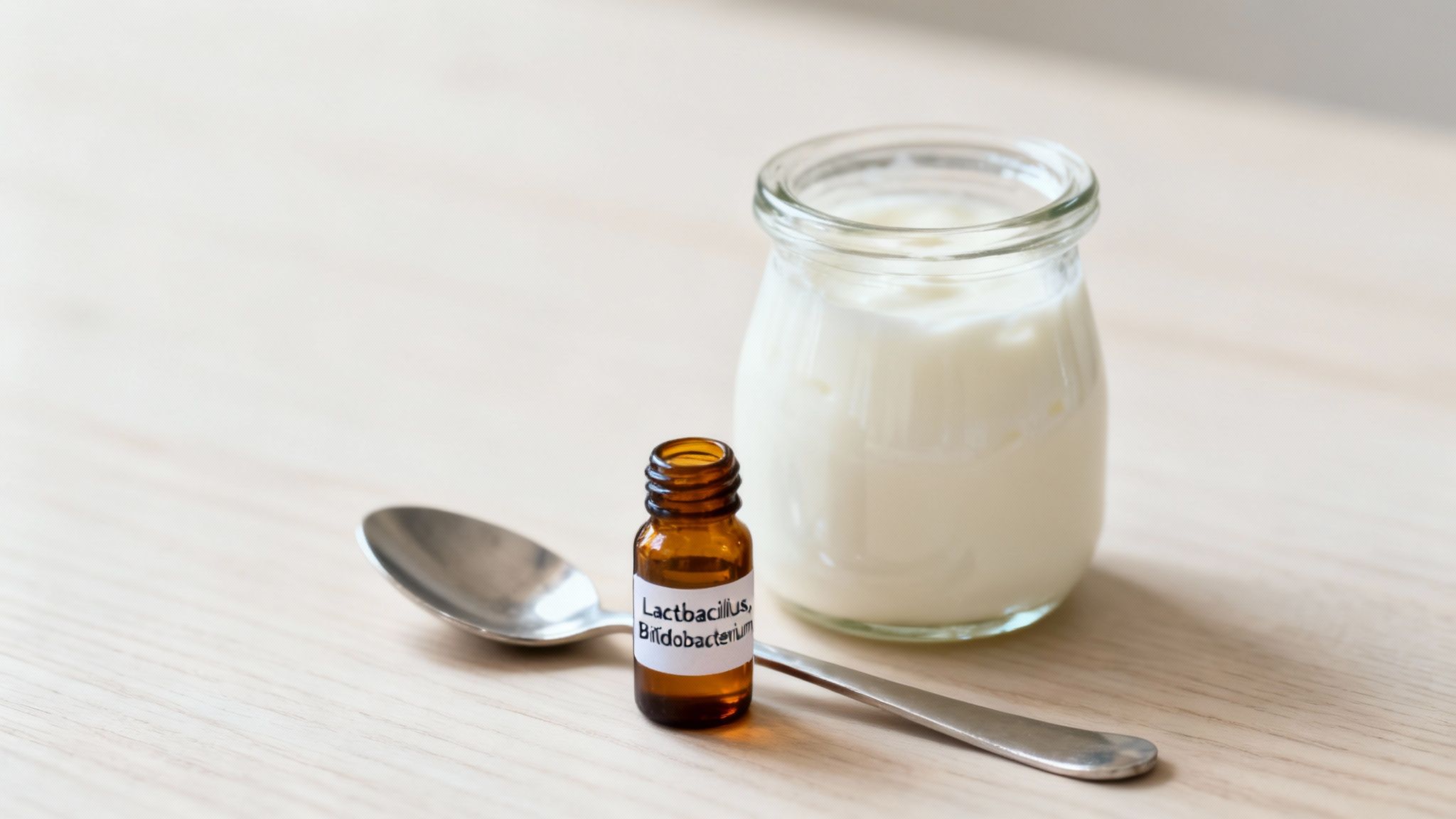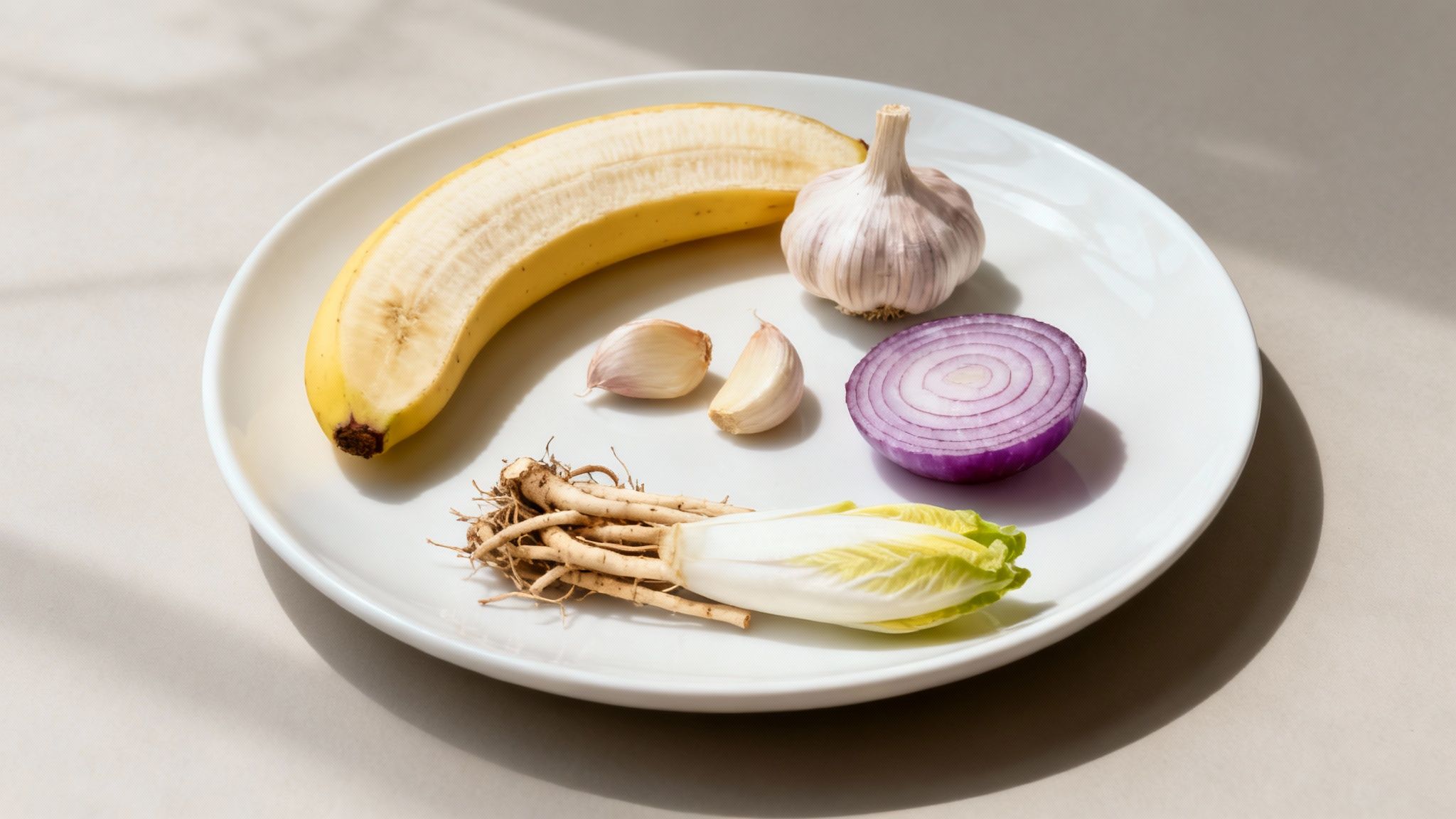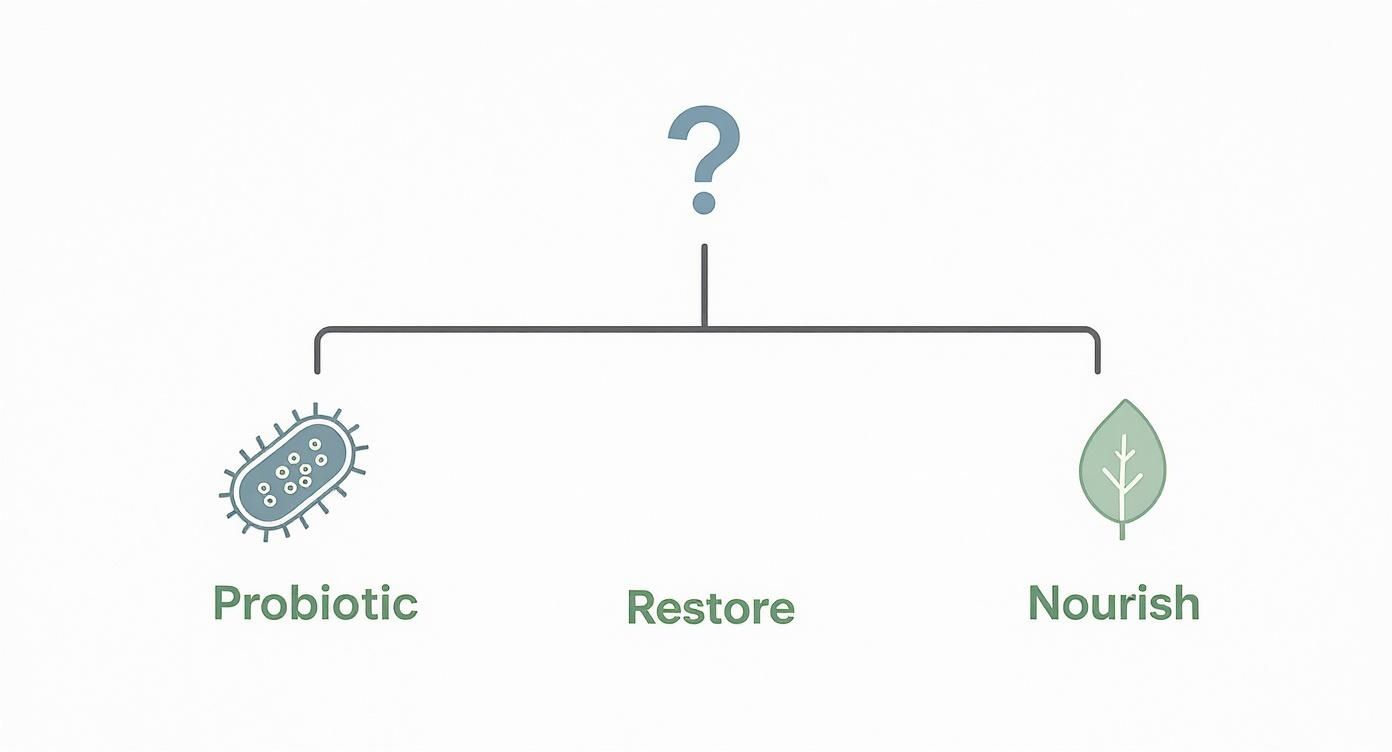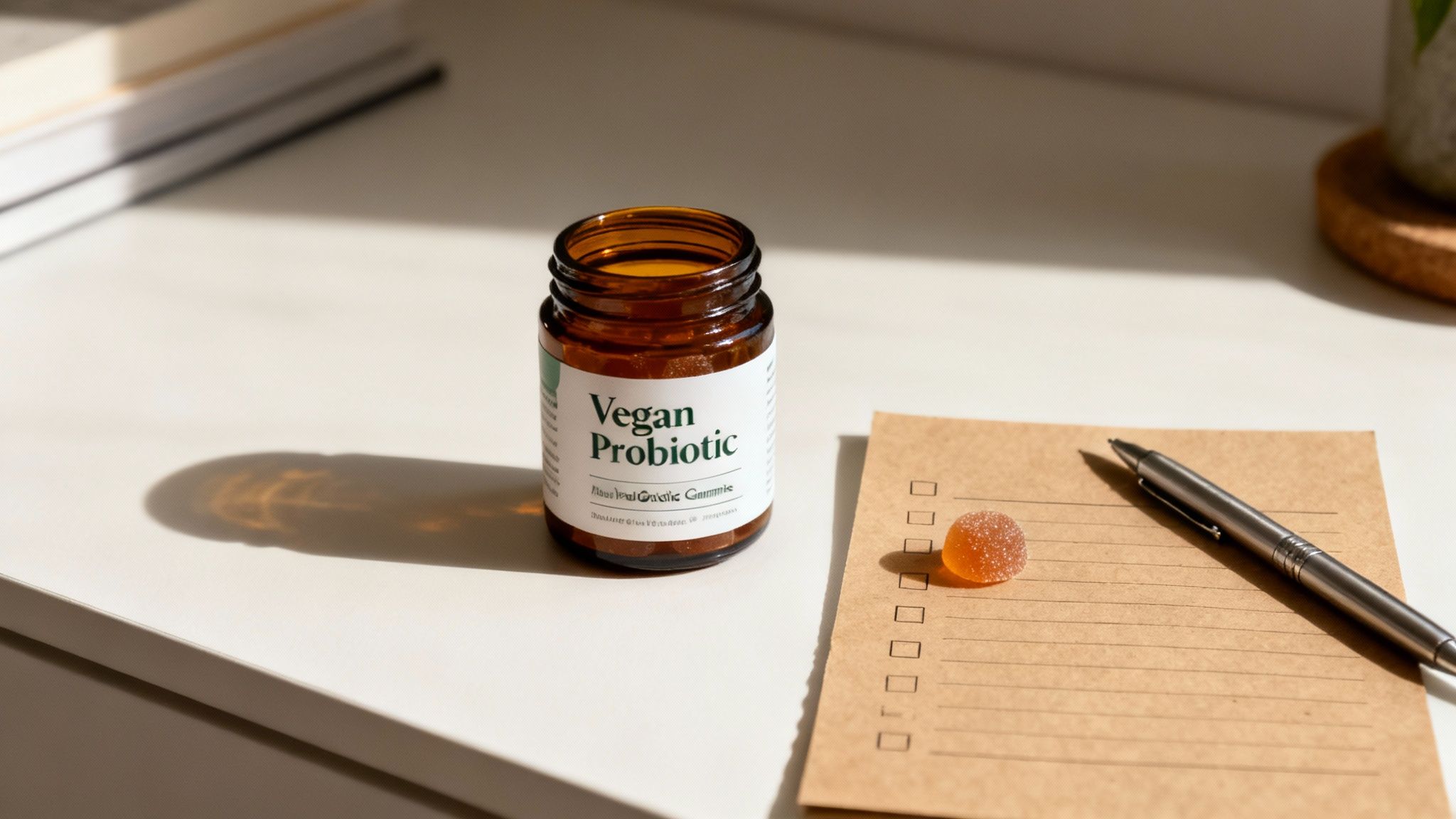Probiotic vs Prebiotic: Your Guide to a Happy Gut
Ever feel like your stomach inflates like a balloon by afternoon? You’re not alone-and it’s not just about what you ate for lunch. When it comes to gut health, it all comes down to a simple but crucial distinction: probiotic vs prebiotic.
Think of it this way: probiotics are the friendly bacteria that keep your gut in check, while prebiotics are the specialized food that helps them thrive. Getting this partnership right is the first step toward conquering that frustrating bloating and digestive discomfort for good. In this guide, we’ll cut through the noise and show you how to build a gut that works with you, not against you.
What Are Probiotics and Prebiotics, Anyway?
Let's be honest, the world of gut health is loaded with confusing terms that all sound alike. But we’re here to make it simple. Understanding the different jobs of probiotics and prebiotics is your ticket to feeling in control of your digestion.
Imagine your gut is an internal garden. You need both the seeds (probiotics) and the fertilizer (prebiotics) to make it flourish. Let’s break down exactly what each one does and why you truly need both.
Probiotic vs Prebiotic at a Glance
Let's kick things off with a quick side-by-side comparison to get a clear picture. This table breaks down the core differences in plain English.
| Feature | Probiotics | Prebiotics |
|---|---|---|
| What They Are | Live, beneficial bacteria and yeasts that add to the population of healthy microbes in your gut. | Specialized plant fibers that act as food for the good bacteria already living in your gut. |
| Primary Job | To directly increase the number of "good guys" in your gut microbiome. | To selectively nourish and stimulate the growth of your existing beneficial gut bacteria. |
| Common Sources | Fermented foods like yogurt, kimchi, kombucha, and high-quality supplements. | High-fiber foods like garlic, onions, bananas, asparagus, and chicory root. |
| Analogy | The Seeds: You are planting new, helpful bacteria directly into your gut's "garden." | The Fertilizer: You are feeding the seeds already planted to help them grow strong and multiply. |
| Key Benefit | Can help restore gut balance after disruptions like a course of antibiotics. | Supports the long-term health and resilience of your entire gut ecosystem. |
As you can see, it's never about choosing one over the other. The real magic happens when you give your body both. This powerful partnership is what truly creates a happy, healthy microbiome so you can enjoy your food without worry.
Understanding Probiotics: The Good Bacteria

Let's talk about the microscopic helpers living inside your gut. Probiotics are live, beneficial bacteria that have a huge impact on everything from how you break down your dinner to how strong your immune system is. Think of them as a personal, dedicated team working around the clock to keep your body's internal ecosystem humming along smoothly.
The word "bacteria" often gets a bad rap, but these are the good guys. They help digest food your body can’t handle on its own, fight off harmful pathogens, and even produce essential vitamins. It's a critical relationship we literally can't live without.
Meet the Probiotic Power Players
Not all probiotics are the same. Different types, known as "strains," have very different jobs. Understanding the key players can help you figure out exactly what your body needs.
-
Lactobacillus: This is probably the most well-known probiotic, found in yogurt and other fermented foods. It’s a superstar at helping your body process lactose (the sugar in milk) and producing lactic acid, which keeps bad bacteria in check.
-
Bifidobacterium: Common in dairy products, these bacteria are vital for supporting your immune system. They also help break down the complex carbs and fiber your body struggles with, which can be a massive help for preventing uncomfortable gas and bloating.
-
Saccharomyces boulardii: Here’s a twist-this one is actually a beneficial yeast. It's famous for its ability to help combat diarrhea and other digestive troubles, particularly those that can show up after a course of antibiotics.
Each strain brings something unique to the party. Learning about the best probiotics for digestion can empower you to target your specific health goals and feel your absolute best.
Why Your Probiotic Population Fluctuates
Life is unpredictable, and sometimes our internal gut team takes a hit. A few common factors can easily throw the delicate balance of your gut microbiome off-kilter:
- Antibiotics: While they're essential for fighting infections, they often wipe out both good and bad bacteria indiscriminately.
- Stress: Chronic stress can create a hostile environment in your gut, making it difficult for your good bacteria to flourish.
- Diet: A diet loaded with processed foods and sugar tends to feed the less desirable bacteria, allowing them to crowd out the beneficial ones.
- Travel: New foods and new environments can throw your whole system for a loop.
This is exactly why it's so important to proactively replenish your good bacteria. It’s not just about fixing a problem after it starts-it's about consistently supporting your body’s natural defenses and digestive power.
How to Get More Probiotics in Your Life
So, how do you keep your microbial team strong? You can boost their numbers through both your diet and targeted supplements. Fermented foods like kimchi, sauerkraut, kefir, and kombucha are fantastic natural sources.
But let’s be realistic-getting a consistent, therapeutic dose from food alone can be tough. This is where a high-quality supplement is a total game-changer. For example, Yuve Vegan Probiotic Gummies provide a delicious and foolproof way to get a potent dose of beneficial bacteria every single day. It takes the guesswork out of it and gives your gut the steady support it craves.
Beyond general wellness, probiotics are also being developed for very specific jobs, like improving oral health. You can find out more about dental probiotics for specific applications and how they work.
Understanding Prebiotics: Fuel for Your Flora

If probiotics are the seeds you plant in your gut's garden, then think of prebiotics as the premium fertilizer that helps them grow strong and flourish. They are the unsung heroes of gut health, working behind the scenes to help your internal ecosystem thrive. We get so caught up in adding good bacteria that we often forget a crucial rule: you have to feed them.
So, what are prebiotics, really? They're specific types of plant fibers that your body can't digest. Instead of breaking down in the stomach, they travel all the way to your large intestine, where they become a feast for your beneficial gut bacteria.
You provide the food for your good microbes, and in return, they produce compounds that nourish your gut lining and support your overall health. It's teamwork at its finest.
The Different Kinds of Prebiotic Fiber
Just like with probiotics, not all prebiotics are the same. Different fibers feed different strains of good bacteria, which is why variety is so important. Here are some of the heavy hitters you’ll find:
-
Fructans (like Inulin and FOS): These are probably the most studied prebiotics. Fructooligosaccharides (FOS) and inulin are brilliant at encouraging the growth of Bifidobacteria, one of the key probiotic players we met earlier. They’re excellent for supporting a balanced gut and promoting regularity.
-
Galactooligosaccharides (GOS): Often found in legumes, GOS also gives a significant boost to beneficial Bifidobacteria and Lactobacilli populations.
-
Resistant Starch: Found in foods like green bananas or cooked-and-cooled potatoes, this type acts like a soluble fiber. It resists digestion and becomes food for your gut flora, helping them produce beneficial short-chain fatty acids like butyrate.
You don't need to memorize the scientific names. Just remember that eating a diverse range of plant-based foods is the best way to get a wide array of these beneficial fibers. Our guide on prebiotics for digestive health dives even deeper into this.
A Quick Personal Story: Our founder, Sam, used to think just "eating healthy" was enough. It wasn't until he started deliberately feeding his gut bacteria with prebiotic foods that he finally found consistent relief from his frustrating digestive issues. That "aha" moment became a huge inspiration for Yuve's mission.
Where to Find These Gut-Nourishing Fibers
The great thing about prebiotics is that they're hiding in plain sight in delicious, everyday foods. You don’t need to hunt down exotic ingredients to start fueling your flora.
Here are some fantastic, easy-to-find prebiotic food sources:
- Garlic and Onions
- Leeks and Asparagus
- Under-ripe Bananas
- Apples
- Oats
- Chicory Root
- Jerusalem Artichokes
- Legumes (like chickpeas and lentils)
Simply adding a few of these into your daily meals can make a real difference over time. It shifts your thinking from just eating for yourself to eating for the trillions of tiny helpers inside you.
The growing awareness of this connection is undeniable. The prebiotic ingredient market is on a massive growth trajectory. This is driven by people just like you who understand how critical it is to nourish the gut microbiome from the ground up. You can learn more about these prebiotic market trends and see just how big this movement has become.
How Probiotics and Prebiotics Work Together
This is where the real magic happens. So often, we get stuck in a "probiotic vs. prebiotic" mindset, but the truth is, this isn't an either/or decision. Think of them as a powerful team-their combined effect is far greater than what either one could achieve alone.
Let's stick with our garden analogy. Probiotics are the seeds you plant. Prebiotics are the high-quality fertilizer that helps those seeds grow strong. You really need both for a flourishing, vibrant internal ecosystem.
When they join forces, this dynamic duo creates what scientists call a synbiotic effect. It’s a fancy word, but it just means they're better together. The prebiotics create the perfect environment for the probiotics to not only survive the harsh journey through your digestive system but to actually thrive and multiply once they arrive.
Stronger Gut Barrier, Less "Leaky Gut"
One of the most important jobs of this partnership is fortifying your gut barrier. Your gut lining acts like a sophisticated gatekeeper, deciding what gets into your bloodstream (like essential nutrients) and what stays out (like toxins and undigested food particles).
When this barrier weakens, it can lead to a condition often called "leaky gut," which is linked to inflammation, food sensitivities, and that awful feeling of being bloated and unwell.
Here’s how the team helps patch things up:
- Prebiotics feed your good bacteria. Simple as that.
- In return, those well-fed microbes produce beneficial compounds called short-chain fatty acids (SCFAs), with butyrate being a key player.
- Butyrate serves as the primary fuel for the cells that make up your gut lining, helping to keep the connections between them tight and secure.
This process keeps your internal "gatekeeper" strong, which is absolutely fundamental for good digestion and overall health.
A strong gut lining is your first line of defense. By feeding your probiotic helpers with prebiotics, you're directly investing in a more resilient digestive system and helping to keep uncomfortable symptoms at bay.
Better Digestion and Nutrient Absorption
We all want to get the most out of the healthy food we eat, right? Probiotics and prebiotics working in concert can significantly improve how your body breaks down food and absorbs vital nutrients.
Think about it: when your gut is populated with thriving colonies of good bacteria, they help dismantle tough fibers and complex compounds your body can’t handle on its own. This process makes it much easier for your system to pull out essential vitamins and minerals from your food.
This improved efficiency often leads to more regular bowel movements and a noticeable reduction in that frustrating gas and bloating that can ruin an afternoon. Dun, dun, dun-unwelcome gas. Yikes! This is how you stop it.
A Boost for Your Immune System
Did you know that around 70% of your immune system resides in your gut? That's not a typo. A 2018 study in Frontiers in Immunology confirmed just how deep this connection is. Your gut microbiome is in constant communication with your immune cells, essentially acting as a training ground to help them tell the difference between friend and foe.
A balanced gut, rich in diverse probiotics and well-fed by prebiotics, helps maintain a calm yet effective immune response. By supporting this gut partnership, you’re not just looking after your digestion-you’re supporting one of your body’s most critical defense systems.
For those of us who find it tough to get a consistent daily intake of both, a smart supplement strategy can be a game-changer. Pairing prebiotic-rich foods with a reliable probiotic source like Yuve Vegan Probiotic Gummies ensures your gut gets the daily support it needs. It simplifies the process, delivering the "seeds" your body needs to make the most of the "fertilizer" you provide through your diet.
When to Prioritize Probiotics or Prebiotics
Okay, so we've covered the science, but let's get practical. How does the whole probiotic vs prebiotic debate actually play out in real life? Knowing when to lean on one over the other is often the missing piece of the puzzle.
It's not about one being "better." It's about being strategic and choosing the right tool for the job. Your gut’s needs can shift dramatically based on your diet, stress levels, or if you’ve recently been on medication.
Are you trying to bring in new troops after a battle, or are you trying to feed and strengthen the army you already have?

This visual really cuts to the chase. If you're looking to actively repopulate your gut after a setback, probiotics are your first call. For steady, long-term gut health, prebiotics are the foundation.
Choose Probiotics for Restoration
Sometimes, your gut microbiome takes a significant hit and needs immediate backup. In these situations, reaching for a high-quality probiotic supplement is a direct and effective way to send in reinforcements.
You should focus on probiotics when you are:
- Recovering from antibiotics. This is the classic scenario. Antibiotics can be a bit of a "scorched earth" tactic, wiping out the bad bacteria but taking a lot of the good guys with them. Probiotics help restock those beneficial strains.
- Dealing with travel-related digestive issues. New foods, different water, and messed-up schedules can throw your system completely out of whack. A probiotic can help stabilize your gut as it adjusts.
- Experiencing a sudden bout of digestive distress. For those unexpected episodes of diarrhea or discomfort, a targeted dose of probiotics can help restore order and get you back on track faster.
Choose Prebiotics for Maintenance
If your digestion is generally on the right track but you want to build a more robust and resilient system for the long haul, prebiotics should be your focus. This is all about fortifying your gut from the inside out.
Prioritize prebiotics when you want to:
- Improve long-term digestive regularity. Consistently feeding your native good bacteria with prebiotic fiber helps them thrive, which in turn supports smoother and more predictable digestion.
- Boost your overall gut resilience. A well-fed microbiome is a strong one. Prebiotics help your friendly bacteria flourish, making them better equipped to handle stress or the occasional dietary slip-up.
- Enhance nutrient absorption. A healthy gut environment is crucial for getting the maximum nutritional bang for your buck from the food you eat. Prebiotics help create that optimal environment.
Your Cheat Sheet for Gut Support
| Your Situation or Goal | Primary Focus | Why It Helps |
|---|---|---|
| Just finished a course of antibiotics | Probiotics | You need to actively reintroduce beneficial bacteria that were wiped out by the medication. |
| Experiencing traveler's diarrhea | Probiotics | Introduces friendly bacteria to help stabilize your gut and outcompete any unfamiliar microbes. |
| Want to improve daily regularity | Prebiotics | Feeds your existing good bacteria, helping them thrive and support consistent digestion. |
| Struggling with frequent gas and bloating | Both | Start with prebiotics to strengthen your gut, then add probiotics to balance your microbiome. |
| Looking for long-term immune support | Prebiotics | A well-nourished microbiome is a cornerstone of a strong immune system. |
| Preparing for a stressful period | Both | Use prebiotics to build resilience and probiotics to provide extra support during the stress. |
Finding a Balanced Approach for Everyday Life
Of course, life is rarely so black and white. Most of us are juggling a bit of stress while also aiming for good long-term health. That's where a balanced strategy really comes into play.
For instance, our founder, Sam, was constantly dealing with bloating after eating certain foods. He discovered that a daily supplement like Yuve Vegan Probiotic Gummies provided the consistent "good guy" reinforcement he needed. At the same time, he made a conscious effort to add more prebiotic-rich foods like garlic, onions, and oats to his diet. It was this one-two punch that finally made a real difference for him.
Ultimately, navigating the probiotic vs. prebiotic world is about learning to listen to your body. Pay attention to its signals and give it the specific support it's asking for. You've got this.
Building Your Smart Gut Health Strategy
Feeling inspired? Good. Let’s turn that motivation into a simple, sustainable plan that actually fits into your life. You've already taken the first step by understanding the key differences in the probiotic vs prebiotic conversation; now it's time to put that knowledge to work.
We get it-it can feel like a lot to take on. The good news is that building a healthier gut doesn't require a total life overhaul. It's all about making small, consistent choices that add up over time.

Actionable Steps for a Happier Gut
Let's break this down into a simple checklist. The key is not to try and do everything at once. Just pick one or two things to focus on this week and build from there.
To Fuel Your Flora (Prebiotics):
- Add Garlic & Onions: These are flavor powerhouses and an easy way to sneak prebiotics into almost any savory dish you’re already making.
- Snack on an Apple or Banana: The perfect grab-and-go option that also happens to feed your good microbes. Simple.
- Incorporate Oats: A bowl of oatmeal to start the day or a scoop of oats in a smoothie is an excellent fiber boost.
To Reinforce Your Troops (Probiotics):
- Enjoy Yogurt or Kefir: When you're at the store, just look for the words "live and active cultures" on the label.
- Try Fermented Foods: Add a spoonful of kimchi or sauerkraut as a zesty side dish to your lunch or dinner.
- Sip on Kombucha: It's a fantastic, bubbly alternative to sugary sodas.
For anyone looking for comprehensive guidance, specialist dietetic services can offer personalized dietary roadmaps.
When Diet Isn't Enough: The Yuve Solution
Here’s a dose of reality: life gets busy. Some days, crafting that perfect, gut-friendly meal just isn't in the cards, and that's completely okay. This is exactly where a smart supplement strategy comes in-not as an afterthought, but as a core part of your plan.
Relying solely on food doesn't always guarantee consistency or potency. You really have no way of knowing how many of those live cultures are actually surviving the journey to your gut.
A Note From Our Founder, Sam:
"I spent years trying to 'eat my way' to better digestion. I’d have a good week with lots of fermented foods and prebiotic veggies, followed by a week of travel or stress where it all fell apart. The bloating and discomfort would come right back. It was this frustrating cycle that inspired Yuve. I needed a simple, reliable way to give my gut daily support, no matter what my schedule looked like."
This is precisely why we created Yuve Vegan Probiotic Gummies. They aren't just an optional extra; they're your daily insurance policy for gut health. Each tasty gummy delivers a reliable, potent dose of beneficial bacteria, ensuring your gut ecosystem gets the consistent support it truly needs to thrive.
Think of it as a proactive step to make your gut health simple, delicious, and non-negotiable. Dive deeper into building your routine by checking out our guide on the best supplements for digestive health.
FAQ: Probiotic vs. Prebiotic
You've got questions, and we've got answers. When you’re figuring out the difference between a probiotic vs. a prebiotic, a few common queries always pop up. Let's clear the air so you can feel confident on your gut health journey.
Can I Take Probiotics and Prebiotics at the Same Time?
Absolutely! In fact, taking them together is often the best approach. This combination creates a powerful partnership known as a "synbiotic" effect. Think of it this way: the probiotics are the new, beneficial workers arriving in your gut, and the prebiotics are their packed lunch, helping them get straight to work.
How Long Does It Take to Feel the Benefits?
This is a great question, but the honest answer is that it's different for everyone. Your gut microbiome is as unique as your fingerprint. Some people report feeling positive changes-like less bloating or more regularity-in just a few days to a week. For others, it might take 2-4 weeks of consistent use to notice a real shift. The key here is consistency.
Do I Need to Refrigerate My Probiotics?
It depends entirely on the product. While many older probiotic supplements required refrigeration, modern technology has given us fantastic shelf-stable options, like Yuve Vegan Probiotic Gummies. These formulas use specific, hardy bacterial strains that ensure the good guys remain potent without needing to be kept cold. Always check the label on your specific supplement for storage instructions.
Are There Any Side Effects to Watch For?
For most people, probiotics and prebiotics are very safe. When you first start, however, you might notice some temporary, mild gas or bloating. Don't panic! This is usually just a normal sign that your gut microbiome is adjusting. This "settling in" period typically goes away within a few days. If you have a compromised immune system or a serious health condition, it's always best to chat with your doctor before starting any new supplement regimen.
Ready to build a smart, simple gut health routine? Yuve makes it easy with our delicious, plant-based supplements designed to help you feel your best from the inside out.
Explore Yuve's Vegan Probiotic Gummies and take the first step toward a happier gut today!
